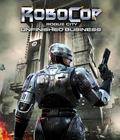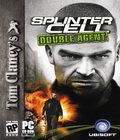Genre: Stealth-Action
Publisher: Ubisoft
Developer: Ubisoft
Release Date: November 7, 2006
If you've never played a game in the Splinter Cell series, you owe it to yourself to give Splinter Cell Double Agent a try. Nothing out there quite duplicates Splinter Cell's unique blend of stealth action, high-tech gadgetry, and gorgeous third-person visual effects. For those already familiar with the series – and I suspect that includes most of you – Double Agent is enjoyable, but its single-player campaign offers little you haven't already seen before in Chaos Theory and earlier iterations of the game.
The general thrust of the Splinter Cell series goes something like this: You play the role of Sam Fisher, government spy. You are assigned a series of missions, most of which require that you infiltrate enemy territory and accomplish some goal (hack a computer, steal documents, or defuse a bomb) either without being seen by anyone or with minimal casualties. The camera follows your player from a third-person perspective, and much of the joy of playing derives from watching Sam Fisher's fluid and realistic movements as he navigates about the map and executes a wide variety of special moves. For example, Sam can climb pipes, peek around corners, crawl through vents, hang from ledges, slide along ropes or zip lines, swim, and can perform numerous other nifty tricks, like the beloved "inverted neck snap."
Performing these fancy moves does not require that the player memorize extended combinations of keys. For better or worse, Sam does just about everything automatically. Generally speaking, if Sam is capable of performing some trick and you move him to the approximate area, he will perform the trick, whether you were trying to get him to or not. For example, Sam may start climbing a pipe when all you were trying to do was walk in front of it, or he may jump out of a frozen lake, grab an armed guard you didn't even know was there, pull him down through a hole in the ice, pull out a blade, and stab the guard in the chest, all because you merely pressed the "up" key. Granted, it's an awesome sight, but some players may wish they had more control over Sam's movements.
The new twist in Double Agent is that Sam is called upon to go undercover and make friends on the inside of a terrorist organization. To earn and maintain their trust, he is sometimes called upon to perform various bad acts, blurring the line between right and wrong. I found that this new scenario made little difference to gameplay. Yes, you have two bosses competing for your loyalty, but pleasing them both isn't very difficult and doesn't really call for you to make many interesting "moral" decisions. Let's face it: Even when you play the good guy, you still kill plenty of innocents. You've just learned to drag their bodies into the shadows to avoid detection.
To run this game, you'll need 8GB of hard-disk space and a beefy video card. Playing the game on an ATI Radeon X1900 XTX, the highest supported ATI card listed on the box, the game chugged on "standard" in-game video settings and at a modest resolution. Nothing has ever slowed my system down to this level. Now don't get excited and rush out to buy a new video card because the graphics are nothing special. In fact, the visual improvements over Chaos Theory are not significant. Sam Fisher looks more muscular and has greater detail in his face and head, but that's about it. I'm amazed that Double Agent is such a resource hog.
Even if your rig is powerful enough to run the game at acceptable detail settings, you may still experience frustration in the form of glitches, bugs, and crashes. For the first time in years, I experienced the dreaded Blue Screen of Death. Fortunately, that only happened once, but there were other problems, such as saved games not loading properly and in-game actions (like cracking a safe) simply not working at all. The multiplayer component comes with an auto-patching feature, which is nice, but then the game crashed after I installed the first patch.
When the game works, it's fun. The maps are linear and generally call for Sam to follow a set path, but the scenery is varied. You will find yourself escaping from prison, sabotaging a luxury cruise ship, and rappelling down a glass skyscraper in Shanghai while fireworks in the distance fill the sky with hues of yellow, green and red.
While the setup sounds like it was made for an action-filled 007 movie, there is little fighting in the game. This is a true stealth title; more often than not, you complete a mission by sneaking around in the shadows and remaining undetected. Despite the powerful rifle slung around your back, if you are spotted, don't think you'll be able to shoot your way out. This game is no shooter. You need to "equip" your gun before firing it, and once equipped, you can barely move, and aiming is imprecise. Moreover, not only are you likely to die if you try to shoot your way out of trouble, but you'll lose the trust of both organizations for which you're working. Most of the time, you'll use your rifle for shooting out lights rather than enemies.
Going undetected and completing secondary objectives result in unlocking various rewards, like EMP grenades, wall mines, and computer-hacking upgrades. I found the unlock system somewhat gimmicky, because I rarely used any of the unlocks as I tried to sneak around the maps without drawing undue attention to myself. I did, however, find occasional good use for the fragmentation grenades.
Another key aspect of gameplay is having the ability to "hack" computers, pick locks, and crack safes. Judging from the fact that similar features appear in game after game in the Splinter Cell series, they must be popular with fans, but I, for one, find them tedious. Although they may add a sense of realism at first, that sense quickly vanishes once you realize how easy and monotonous it is do perform these tasks. To pick a lock, simply tap the movement keys for a few seconds. To crack a safe, alternate hitting the keys for "left" and "right" until you hear a click and the safe pops open. A well-trained banana could perform these acts of espionage.
Hacking into a computer gives you access to secure e-mails, which often contain useful information like passwords and codes. There are also plenty of useless emails, like those containing standard office chit-chat such as, "Donuts are in the break room!" Presumably, these exist to help develop the plot or add some background story. Fortunately for those (like me) who are not interested in reading this fluff, the useful e-mails are often identified with helpful subject titles, like "RE: the password." You can sometimes obtain the same information by grabbing an NPC and interrogating him.
Sam is equipped with a number of gadgets, but using them effectively can be difficult because the weapon-selection interface is awkward and confusing to use. I had to take my right hand off the mouse most of the time and fiddle with the arrow keys and enter button just to select a grenade.
I was also less than enthralled with the mission system and interface. I often found myself unsure of what I was supposed to be doing, and had to repeatedly press F1 (followed by clicking on "objectives") to check my objectives in a cumbersome two-step process. Sometimes doing this would reveal that I somehow failed an objective by neglecting to do something within a narrow window of opportunity.
Double Agent's multiplayer component took me pleasantly by surprise. Unlike so many games that add multiplayer capability simply by throwing in a deathmatch option, Double Agent includes a different and exciting multiplayer experience that incorporates the game's stealth tactics. There are several different maps, each with different objectives, which generally call for you to hack one or more computers (which, unlike in the single-player game, is accomplished merely with the press of a button) and download the most information without getting killed.
Six people can play at once, but finding a full game isn't always easy because there is no traditional server browser. Instead, you indicate your willingness to play a game and then wait around in a virtual waiting area until enough people join to start a game.
I was somewhat distressed to see an in-game advertisement for NIVEA skin cream (Note to Self: Do not purchase NIVEA skin cream), but I suppose advertising in video games is something we're going to have to learn to live with.
Splinter Cell: Double Agent offers more of the third-person stealth action we've come to expect from the Splinter Cell franchise, and it adds a unique, fast-paced multiplayer format unlike any online game I have played before. In terms of overall presentation, not much has changed from the series' tried-and-true formula. Playing through the single-player campaign is an enjoyable, yet familiar, feeling.
Score: 7.7/10
More articles about Splinter Cell Double Agent











 Tom Clancy's Splinter Cell Double Agent will completely revolutionize and reinvent the spy action genre by introducing an unprecedented double agent concept and an entirely new breed of game play that adds an exciting new dimension to the gaming experience.
Tom Clancy's Splinter Cell Double Agent will completely revolutionize and reinvent the spy action genre by introducing an unprecedented double agent concept and an entirely new breed of game play that adds an exciting new dimension to the gaming experience.







































